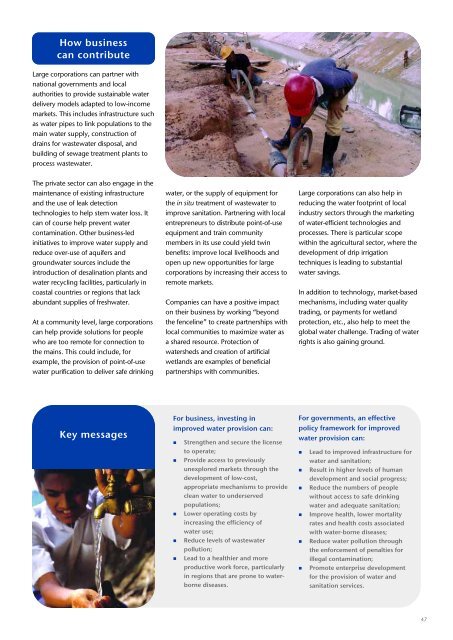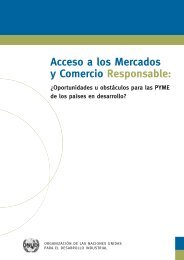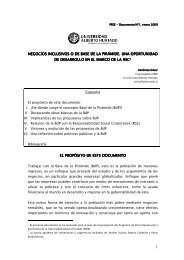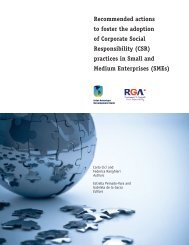Doing Business with the World - Mapeo de Promotores de RSE
Doing Business with the World - Mapeo de Promotores de RSE
Doing Business with the World - Mapeo de Promotores de RSE
You also want an ePaper? Increase the reach of your titles
YUMPU automatically turns print PDFs into web optimized ePapers that Google loves.
How businesscan contributeLarge corporations can partner <strong>with</strong>national governments and localauthorities to provi<strong>de</strong> sustainable water<strong>de</strong>livery mo<strong>de</strong>ls adapted to low-incomemarkets. This inclu<strong>de</strong>s infrastructure suchas water pipes to link populations to <strong>the</strong>main water supply, construction ofdrains for wastewater disposal, andbuilding of sewage treatment plants toprocess wastewater.The private sector can also engage in <strong>the</strong>maintenance of existing infrastructureand <strong>the</strong> use of leak <strong>de</strong>tectiontechnologies to help stem water loss. Itcan of course help prevent watercontamination. O<strong>the</strong>r business-ledinitiatives to improve water supply andreduce over-use of aquifers andgroundwater sources inclu<strong>de</strong> <strong>the</strong>introduction of <strong>de</strong>salination plants andwater recycling facilities, particularly incoastal countries or regions that lackabundant supplies of freshwater.At a community level, large corporationscan help provi<strong>de</strong> solutions for peoplewho are too remote for connection to<strong>the</strong> mains. This could inclu<strong>de</strong>, forexample, <strong>the</strong> provision of point-of-usewater purification to <strong>de</strong>liver safe drinkingwater, or <strong>the</strong> supply of equipment for<strong>the</strong> in situ treatment of wastewater toimprove sanitation. Partnering <strong>with</strong> localentrepreneurs to distribute point-of-useequipment and train communitymembers in its use could yield twinbenefits: improve local livelihoods andopen up new opportunities for largecorporations by increasing <strong>the</strong>ir access toremote markets.Companies can have a positive impacton <strong>the</strong>ir business by working “beyond<strong>the</strong> fenceline” to create partnerships <strong>with</strong>local communities to maximize water asa shared resource. Protection ofwatersheds and creation of artificialwetlands are examples of beneficialpartnerships <strong>with</strong> communities.Large corporations can also help inreducing <strong>the</strong> water footprint of localindustry sectors through <strong>the</strong> marketingof water-efficient technologies andprocesses. There is particular scope<strong>with</strong>in <strong>the</strong> agricultural sector, where <strong>the</strong><strong>de</strong>velopment of drip irrigationtechniques is leading to substantialwater savings.In addition to technology, market-basedmechanisms, including water qualitytrading, or payments for wetlandprotection, etc., also help to meet <strong>the</strong>global water challenge. Trading of waterrights is also gaining ground.Key messagesFor business, investing inimproved water provision can: Streng<strong>the</strong>n and secure <strong>the</strong> licenseto operate; Provi<strong>de</strong> access to previouslyunexplored markets through <strong>the</strong><strong>de</strong>velopment of low-cost,appropriate mechanisms to provi<strong>de</strong>clean water to un<strong>de</strong>rservedpopulations; Lower operating costs byincreasing <strong>the</strong> efficiency ofwater use; Reduce levels of wastewaterpollution; Lead to a healthier and moreproductive work force, particularlyin regions that are prone to waterbornediseases.For governments, an effectivepolicy framework for improvedwater provision can: Lead to improved infrastructure forwater and sanitation; Result in higher levels of human<strong>de</strong>velopment and social progress; Reduce <strong>the</strong> numbers of people<strong>with</strong>out access to safe drinkingwater and a<strong>de</strong>quate sanitation; Improve health, lower mortalityrates and health costs associated<strong>with</strong> water-borne diseases; Reduce water pollution through<strong>the</strong> enforcement of penalties forillegal contamination; Promote enterprise <strong>de</strong>velopmentfor <strong>the</strong> provision of water andsanitation services.47
















